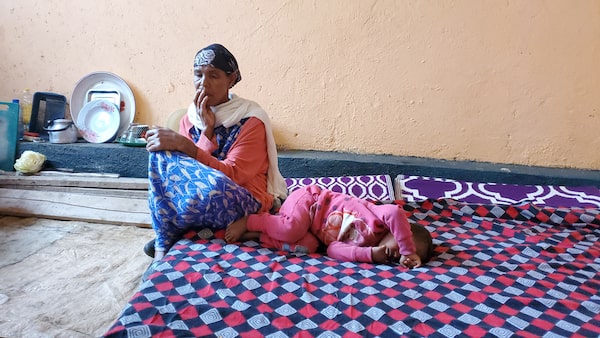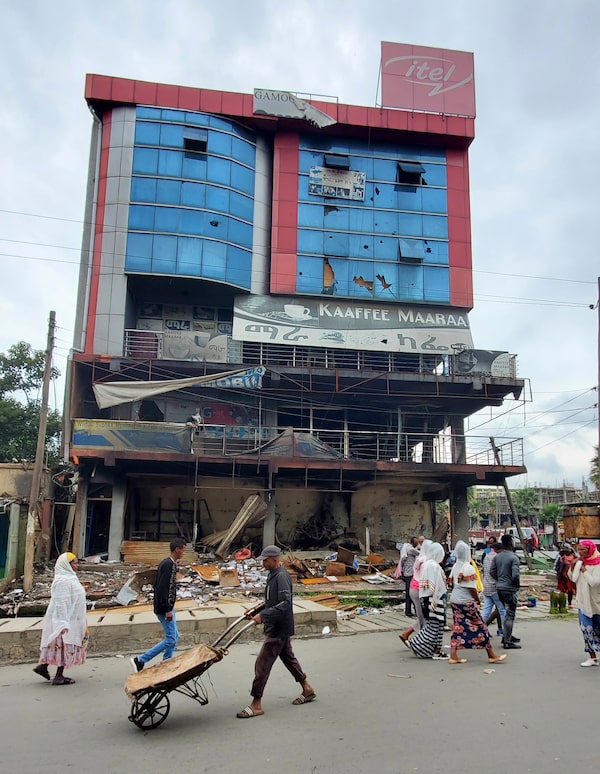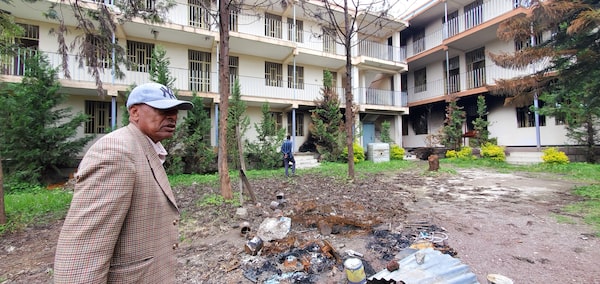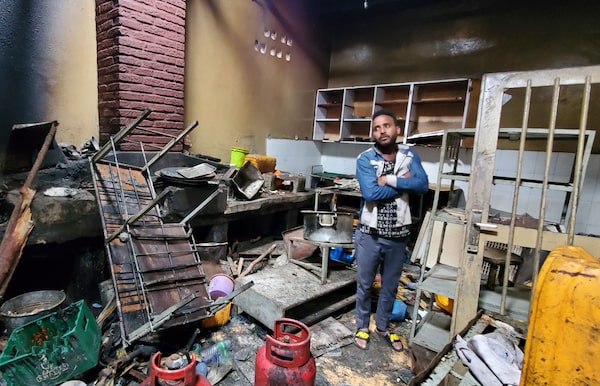
Abebech Shiferaw, a 49-year-old widow whose house was burned to the ground during the attacks, with her child.Sawra Tafari/The Globe and Mail
The mob of young men, carrying machetes, marched into the neighbourhood with a list of names and ethnicities of its residents. “This land is Oromo land,” they chanted.
Abebech Shiferaw, a 49-year-old widow of Amhara ethnicity, screamed for her children to flee as the mob broke into her home. She raced out, carrying her youngest child, and watched the mob set fire to her house and neighbouring houses in Shashamene, the epicentre of Ethiopia’s latest violence.
“We waited almost a lifetime to own a house and they destroyed it in the blink of an eye,” she told The Globe and Mail. “They did not just make me homeless – they broke my will to live.”
Latest violence in Ethiopia imperils its transition to democracy
Thousands of migrants head back to Ethiopia after deportations as pandemic sparks fears
At least 239 people have been killed and 3,500 arrested in the violence that erupted after unknown gunmen on June 29 assassinated the popular singer Haacaaluu Hundeessaa, a former political prisoner who became an icon to the Oromo people.
The intercommunal violence, combined with a heavy-handed response from Ethiopia’s security forces, has exposed the ethnic fault-lines and political divisions that could jeopardize the democratic aspirations of the country’s Nobel Peace Prize-winning Prime Minister, Abiy Ahmed.
For years, authoritarian governments had suppressed the ethnic tensions in Ethiopia. But a wave of anti-government protests by the Oromo people helped Mr. Abiy, himself an Oromo, to ascend to power in 2018. Since then, he has freed political prisoners and lifted the ban on opposition parties, but Ethiopia’s internal tensions have continued to escalate, forcing more than a million people to flee from their homes.
In an attempt to control the latest violence, the government deployed military forces and shut down internet services for more than two weeks. Internet access remains sporadic and reports from cities such as Shashamene have been slow to trickle out.

Burned commercial buldings which were set on fire by a mob during the violence after the assasination of Oromo's pop singer Hachalu Hundessa in Shashamene, Ethiopia, on July 19, 2020.Sawra Tafari/The Globe and Mail
“We are investigating reports of security force violence and lack of response, as well as attacks against ethnic minority communities, including killings, the destruction of homes and businesses, and displacement,” said Laetitia Bader, the Human Rights Watch director for the Horn of Africa region. “So far, property damage appears on a larger scale than in previous bouts of unrest.”
Among those arrested since June 30 are dozens of politicians and journalists, many of whom are being held incommunicado in undisclosed locations, according to a report this week by Amnesty International.
“The Ethiopian authorities are causing great anguish to the families of those arrested by failing to divulge their whereabouts,” said Deprose Muchena, the Amnesty director for East Africa.
Mr. Abiy’s government has tried to balance the growing demands from Ethiopia’s various ethnicities, including the Oromo, the country’s largest ethnic group. But many Oromo leaders have been disappointed that Mr. Abiy refused to give them greater power. His planned transition to multiparty democracy “has uncorked dangerous ethno-nationalist frictions,” according to a report this month by the International Crisis Group.
Shashamene, a city of about 100,000 people in the Oromo region, is a trading hub and a former tourist centre, well-known for its Rastafarian community who celebrated the former emperor Haile Selassie. But in recent months its ethnic conflicts have increased.
The attack on Ms. Shiferaw’s home on June 30 left her and her four children sheltering in a local church and worried about their safety.
“I was born and raised in Shashamene, it’s the only place I know. But to the rioters, I was suddenly an outsider who did not belong here,” she says.

Tigabu Yigzaw surveys the damage in a hotel that he owns in Shashamene, Ethiopia.Sawra Tafari/The Globe and Mail
On that same morning, the day after Mr. Hundeessaa’s assassination, Shashamene hotel owner Tigabu Yigzaw was awakened at 5 a.m. by the bells from a nearby church, raising the alarm about the arrival of angry mobs.
He reached his hotel to find it on fire. Rioters were stealing its alcohol, smashing his windows and carting away its furniture in trucks with no licence plates. His security guard was tied to a tree and beaten. His son, the hotel manager, was lying unconscious and bleeding after a machete attack.
“It was a nightmare,” Mr. Yigzaw said. “My business was attacked because I am Amhara.”
He said he doesn’t feel safe in Shashamene any more. He worries that Ethiopia could suffer a genocide.

A restaurant owner, Munir Ahmed, surveying the damage to his business in Shashamene.Sawra Tafari/The Globe and Mail
Munir Ahmed, manager of one of the city’s most popular restaurants, saw his restaurant destroyed by hundreds of rioters who were deliberately targeting the non-Oromo businesses on his street.
“We cried, we begged them to stop,” he said. “To them, we were the enemy. They had a plan, almost like a mission, and they executed what they came to do. Everything was destroyed.”
Most of his employees hid for several days and then fled the city, he said. “For the first time, our ethnicity is a burden. The rioters have won.”
Our Morning Update and Evening Update newsletters are written by Globe editors, giving you a concise summary of the day’s most important headlines. Sign up today.
 Geoffrey York
Geoffrey York